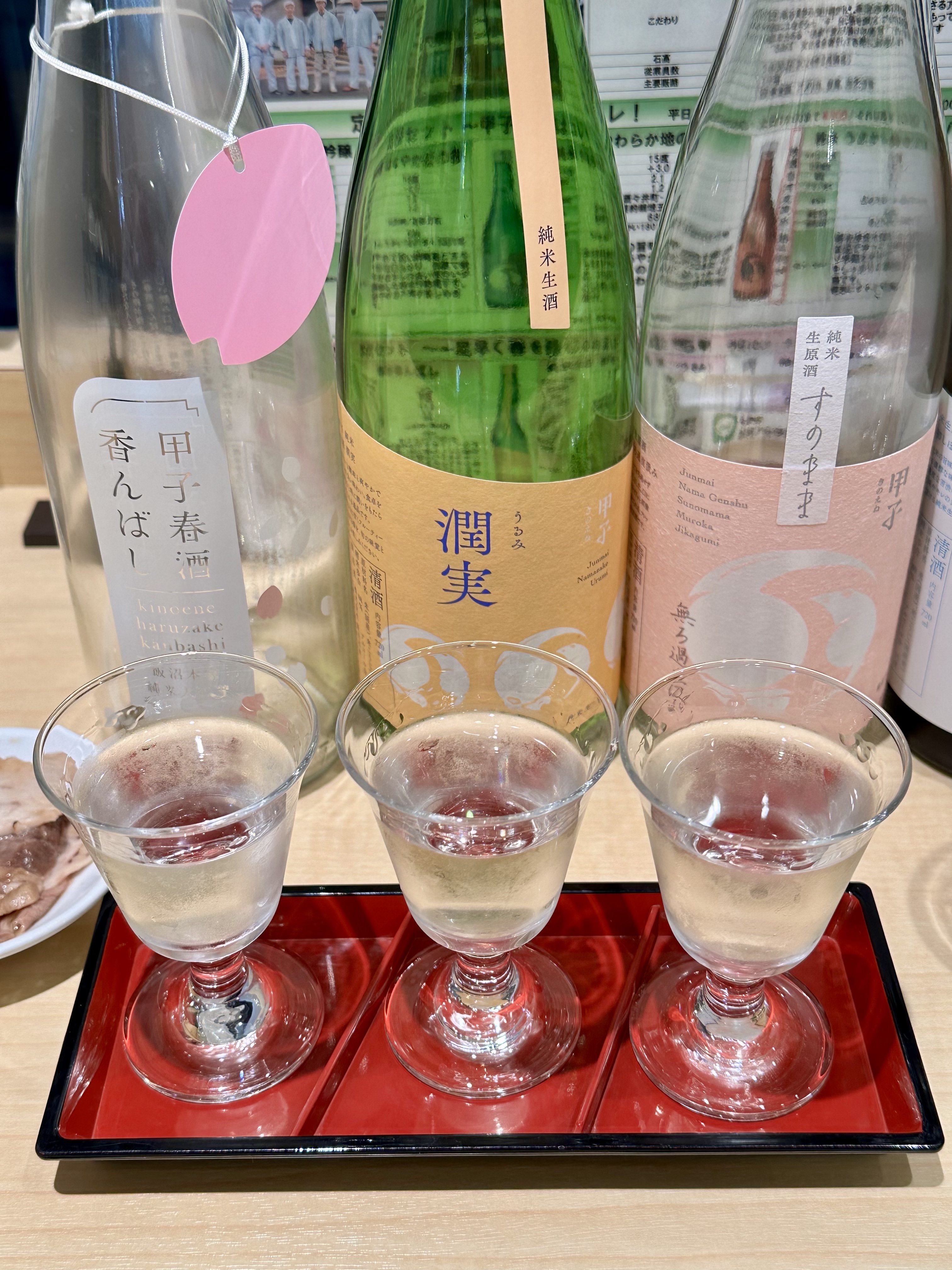One of the best ways to know a country by heart is to explore their culture and experience it firsthand. Japan is home to a rich and well-preserved culture, and is a country that is in fact proud to showcase this to the entire world. Despite being widely known for being leaps and bounds ahead of its time when it comes to electronics and transportation systems, one of the main reason Japan receives a huge amount of tourists per year is because of how they are able to preserve their culture in the face of these technological advancements.
Even in very urbanized Tokyo, there are several traditional experiences not to be missed. Here are 12 Japanese traditions you must experience when in Tokyo!
1. Craft traditional delights in Tokyo (from USD 92.0)
Embark on a two-and-a-half-hour escapade in Tokyo, delving into the artistry of crafting traditional Japanese sweets. This workshop is ideal for two to eight guests and teaches the creation of stunning nerikiri wagashi, daifuku mochi, and dango mochi using time-honored methods and gluten-free and vegan ingredients. Gain insights into the cultural significance of these treats, which are intrinsic to Japanese festivals.
As you knead, shape, and decorate your creations, you’ll refine your culinary skills and unlock a deeper understanding of the cultural significance these confections hold. And to sweeten the deal, you can enjoy some of your own creations with a free matcha green tea and then take home the rest, ensuring the enchantment lingers even after the workshop concludes.
Mochi and Traditional Sweets Making with Tea Ceremony
Duration: 2.5hours
2. Tsukiji Fish Market

Tsujiki Fish Market is the largest wholesale market for fish, fruits, and vegetables not just in central Tokyo, but also in the entire world. Each day, they handle over 2, 000 tons of marine products.
What’s interesting about this place is that before the sun rises, you can catch the live auction of their tunas. This is perfect for those who might have arrived a little early in city or to the early birds who like to hustle before the sun comes up. Registrations for the tuna auctions start at 4:30 am at the fish information center inside the Kachidoki Gate off Harumi Street. Only a maximum number of 120 visitors can watch the auction, so be sure to be there as early as you can (Some people even line up as early as 3:00 am)!
Of course your Tsukiji adventure won’t be complete without trying out their sushi. Since this is a fish market, it’s guaranteed that you would only have the freshest sushi breakfast to ever grace your tastebuds. You will be met by a lot of sushi stalls, so you have to really make your way in to find the best sushi places. Some of the widely recognized stores are Sushi Dai, Daiwa-Zushi, and Sushizanmai. Prices in these places would range from 300 up to 800 yen (2.70 - 7.20 USD) - so yes, even with all the great food the Tsukiji Fish Market has to offer, you can be sure you won’t burn a hole in your wallet.
Tsukiji Fish Market
Address: Tsukiji is located at 5-2-1 Tsukiji, Chuo, Tokyo 104-0045, Japan
Website: Tsukiji Fish Market
3. Watch a sumo practice in Ryogoku (9,000 JPY (87 USD))

One of the most unique sports Japan offers to the world is sumo wrestling. If you are a fan or only a curious traveler, visit the sumo stable in the Ryogoku neighborhood of Tokyo and watch sumo wrestling practices up close. Sumo is Japan’s national wrestling sport that is preserved from ancient times, initially, to entertain Shinto deities. Now, you’ll get to witness part of Japan’s ritual, learn the concept and significance of sumo, and the proper etiquette during practices. Visitors are expected to abide by the stable rules, stay for the whole duration of the morning training for 30 to 120 minutes, and ultimately, watch the wrestlers more intimately and in a closer perspective. Don’t forget to bring your camera, as you’ll get a chance to take photos with the wrestlers themselves.
Watch a sumo practice in Ryogoku
Duration: can vary, roughly 50-165 minutes
Price: 9,000 JPY (87 USD)
You might be interested in these Airbnbs!
4. Beat a taiko drum (5,500 JPY (53 USD))

Ignite your musical senses and learn the Japanese traditional percussion instrument, taiko drum. Taiko drums originated in the sixth century and are used for various functions since then - communication, military action, entertainment, and religious ceremonies. In modern times, it is used in social movements for Japan’s minority. To participate in this activity is also to immerse yourself in the Japanese traditional field of music. Add playing taiko drums to your experience and discover Japanese music with the aid of a world-renowned and professional coach. Taiko drum playing, as well as playing other musical instruments like the takebue (bamboo flute) is open for everyone, even for first-timers. The class studio is located about a 10-minute walk from Ryogoku Station. Beating the Taiko drums can be fun and tiring at the same time, so be sure to bring an extra pair of clothes to keep up with the rhythm of the Taiko!
Beat a taiko drum
Duration: 1.5 hours
Price: 5,500 JPY (53 USD)
Tokyo Tour Guide
Ayano
Hello! I am Ayano, a local host in Tokyo. I have been living in Tokyo for over 10 years, so I know a wide range of restaurants, bars, cafes, and tourist spots! Leave your Tokyo sightseeing to me. I have traveled to various countries and had unforgettable experiences. Being passionate about traveling, I really want to take you to the captivating places in Tokyo. As photography is my hobby, I wi... Read more
Tours by Ayano
5. Be Invited to a Japanese tea ceremony (from USD 46.0)

To experience Japanese culture would not be complete without a Japanese tea ceremony. This is perfect for tea-lovers and those who want to experience an authentic “tea party.” More than a ceremony, “Chanoyu” or “Chado” (Japanese term for Japanese tea ceremony) is an activity of spirituality, finding relaxation, and displaying a passion for procedures and materials involved. For 45 to 90 minutes, enjoy a pleasant afternoon sipping tea and learning the delicate procedure of tea making inside a traditional Japanese room with a view of the scenic bonsai garden. Guests are provided with a beautiful, long-sleeve Furisode kimono, and taught how to make powdered green tea by themselves. To complete the experience, you can wear a kimono and have your picture taken inside the room or at the botanical garden. This pleasant experience can be sought out at Shunkaen BONSAI Museum in Edogawa-ku, Tokyo.
Be Invited to a Japanese tea ceremony
Duration: 1.5 hours
Price: 4,000 JPY (38 USD)
byFood experiences
1) Tea ceremony in a traditional room
Immerse yourself in the captivating allure of traditional Japanese culture within Tokyo’s Yanaka district, where a tea ceremony and wagashi-making adventure await. Guided by a skilled tea ceremony master, you’ll partake in the art of a timeless tea ritual. Craft two exquisite nerikiri wagashi – intricate confections that reflect the changing seasons – savoring one while treasuring the other as a keepsake.
Enhancing the ambiance are antique matcha bowls, each bearing over a century of history, imbuing the experience with a touch of authenticity. Delve into the intricacies of proper tea etiquette and matcha preparation, all within the serene embrace of a tea room setting.
2) Tea ceremony experience in Asakusa
Experience the timeless elegance of a Japanese tea ceremony nestled in the heart of Tokyo’s traditional district, Asakusa. This one-hour immersive experience extends a warm welcome to groups of two to ten guests, catering adeptly to diverse dietary preferences such as gluten-free, halal, vegan, vegetarian, and pescetarian.
Delve into the profound history and intricate etiquette of the tea ceremony, while you observe a masterful demonstration. Elevate your engagement with this art form as you personally craft your own matcha, all while seated on the traditional tatami mat flooring of a charming tea house setting.
Tea Ceremony and Wagashi Making in Traditional Tea Room
Duration: 2hours
Tea Ceremony Experience in Asakusa
Duration: 1hours
6. Learn and experience the world of geishas (8,900 JPY (86 USD))

Learn all about Japan’s famous geishas at Omori Chaya. Here, you will understand their history and culture, debunk myths, and be entertained by authentic geisha women. Translates as “performing artists,” historically, a geisha was hired to entertain guests during banquets and occasions through dancing, initiating games, and conversations. The same activities will be relived here. Geisha performances include playing musical instruments (Japanese stringed instrument), singing songs, and sometimes narrating poetry while serving guests traditional tea. Upon seating at the ochaya (tea house), you will be provided with pamphlets of information to introduce to you geisha’s history, culture, and the proper event decorum. A photo opportunity with a geisha is also available at the end of the event.
Learn and experience the world of geishas
Duration: 1.5 hours
Price: 8,900 JPY (86 USD)
7. Tokyo sumo morning practice tour in Ryogoku (75 USD)

Another thing that Japan is popular for? Sumo wrestlers.
Sumo wrestling is the traditional Japanese national sport that has been depicted in the Record of Ancient Matters (Japan’s oldest historical record) and Nihon-shoki (the oldest chronicles of Japan). Magical Trip provide tours that allow visitors to watch sumo wrestlers’ morning training in Sumo Town, Ryogoku. You will get to experience and learn about a sumo wrestler’s daily life, how big they really are, and even take photos and have a conversation with them! Afterwards, a local guide will take you to the “World of Sumo” where you’ll learn more about the questions you’ve been dying to know such as what do sumo wrestlers eat, what are the rules of a sumo match and more.
Tokyo sumo morning practice tour in Ryogoku
Duration: 2 hours
Price: 75 USD
8. Katana Restaurant in Akihabara [PERMANENTLY CLOSED]
Akihabara is most famous for its wide array of electronic shops and buildings filled with anime collectibles and manga, but aside from this, there are a lot of restaurants you may actually want to check out. One of these is the Katana Restaurant.
As you might have guessed, Katana Restaurant showcases different works of Katana (sword) which have all been certified by The Society for Preservation of Japanese Art Swords. So for anyone who’s a big fan of the Japanese art of sword-fighting (and the long-held Japanese tradition of making good food), this restaurant is surely a treat for you.
To protect the swords, they are kept in a strong glass wherein the temperature and humidity are regulated. This gives a cooler atmosphere in the restaurant. Worry not though because Katana Restaurant provides blankets to keep you warm.
One of their specialties is the famous Okonomiyaki which is grilled just the way you like it. Average cost for Katana Restaurant would be pegged at around 3,500 Yen (31.33 USD).
Katana Restaurant in Akihabara
Address: Marunouchi building 6F, 2-4-1, Marunouchi, Chiyoda-ku, Tokyo
9. Japanese food-making class with Mari

Mari Nameshida, who is also famously known as Mari, will teach you different Japanese cuisines!
Unlike other cooking lessons, Mari teaches cooking in her own home, giving her students a more cozy environment to practice their Japanese food-making skills. Apart from that, Mari also speaks fluent English and Chinese, so don’t worry about language barriers in the class.
Mari’s classes cost around 7,500 Yen (67.13 USD) per course. There are also many courses choose from, so if you want to focus on one specific type of Japanese food, Mari has got you covered.
These courses include: Japanese Homemade Dish, Japanese Vegetarian Dishes, Japanese Sweets, Intensive Course, Therapeutic Japanese Foods, Regular Cooking course for residents, and Japanese Bread.
Seats to her classes are given on a reservation basis, which you may check out at their website listed below.
Japanese food-making class with Mari
Address: 2-13-5, Shintomi, Chuo-ku, Tokyo Japan
10. Wear a kimono in Shibuya (5,500 JPY (53 USD))

A kimono is Japan’s national attire. With a unique fabric called tanmono, it is often paired with an obi belt and zori shoes to complete the outfit. This type of experience allows you to find Japanese culture within the balance of old and new, past and present, traditional and young. Enjoy the beauty of the vibrant kimonos and strike a pose for a photo session.
Wear a kimono in Shibuya
Duration: 4 hours
Price: 5,500 JPY (53 USD)
11. Become a ninja (15,000 JPY (145 USD))

A ninja or shinobi, which means “those who act in stealth,” is a type of traditional warrior that is well-known for “ninjutsu.” Ninjutsu is a practice in armed combat, weapon techniques, meteorology, geometry, and breathing synthesis. With a professional trainer from a ninja clan, learn shinobi’s five basic 420-year-old skills, and admire their hand-crafted weapons made by the trainer themselves. Dressed in ninja attire, you’ll be introduced to meditation, Embu demonstrations, and different ninja weapons. Then, you’ll learn stealthy steps, swordsmanship, shuriken, blowgun, and Kuji-Kiri techniques. So, have fun and be well-informed of Japan’s fighting tradition for 15,000 JPY (145 USD) of private sessions per group. And don’t forget to take photo souvenirs!
Become a ninja
Duration: 1.5 hours
Price: 15,000 JPY (145 USD)
12. Learn Japanese calligraphy (6,250 JPY (61 USD))

If you are a lover of art and calligraphy, you may take part in this one-hour Japanese calligraphy workshop and learn the techniques used to write beautifully. Your final creation can be a perfect souvenir or a nice present to take home. Initially coming from the Chinese tradition, Shodo or Japanese calligraphy has developed its own distinctive typographic style that is widely used throughout history. Shodo, considered an art, is done well by tuning in to your feelings while working on every character and stroke, thin or thick. Experience all of these using a traditional brush, ink and your choice of material - paper, t-shirt, Japanese fan, wind bell, or wooden frame. You can write your name or your favorite quote - there’s no limit!
Learn Japanese calligraphy
Duration: 1 hour
Price: 6,250 JPY (61 USD)
13. Play the Shamisen and Koto instrument (5,000 JPY (48 USD))

Another activity unique to Japanese tradition is the playing of Shamisen and Koto - two of Japan’s traditional stringed instruments. This is a wonderful experience, especially if you’re a musically inclined person, as you can broaden your skills and knowledge in the category of folk music. Anyone can learn, even without prior knowledge of music, with the help of a professional Shamisen and Koto teacher. Likened to a banjo, the Shamisen is commonly used in the traditional Japanese performance, whether storytelling, puppetry, dance, as well as any other folk music genre. Koto, on the other hand, is the most recognizable musical instrument in Japan, known as the Japanese harp. Together with the Shamisen and a flute, they form a music ensemble that is true to Japanese traditional music.
Play the Shamisen and Koto instrument
Duration: 1 hour
Price: 5,000 JPY (48 USD)
Immerse yourself in authentic Japanese culture in Tokyo
Japan has won the world over for being one of the rare countries that can strike the perfect balance between preserving their centuries-old culture and being at the forefront of technological innovation.
And while it’s very tempting to just walk around and take snapshots of everything and anything you see, it’s a whole lot more fulfilling to be immersed in the new culture you are experiencing. For this, you can bet that the capital of Japan has so much to offer.
History
Get Trip101 in your inbox
Unsubscribe in one click. See our Privacy Policy for more information on how we use your data


























Create an account to